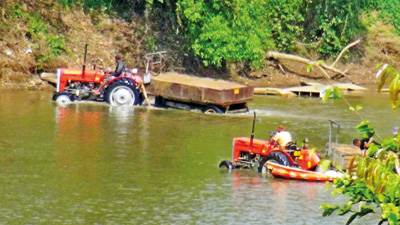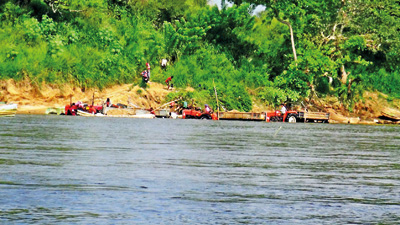News
Illegal sandminers rampant in north after licences scrapped
Illegal sandmining has rapidly increased in the north on state and private land following the new government’s decision to suspend the licence system for sand transport, prompting a violent reaction from frustrated locals and a warning of public protests.
In all the five districts of the north, illegal sandmining is being carried out in broad daylight as well as at night, with local authorities and police reportedly turning a blind eye to the activity.
The government last week announced it would temporarily suspend the licence system for a week to thwart mafia groups that had been deriving huge profits from controlling the transport of sand and other construction materials.
Cabinet said it would review its decision in a week, saying it hoped its move would bring down the cost of building materials.
The licence system suspension has had unexpected repercussions, with reports that it has caused a sharp increase in illegal sandmining.
Environmentalists, meanwhile, say the scrapping of licences to transport sand muddies the legal requirements for mining as the law clearly indicates that an industrial mineral licence and a transportation licence must be issued simultaneously to explore for, or mine, transport, process, trade in or export minerals.
On Tuesday, frustrated villagers in northern coastal villages took the law into their own hands by chasing away illegal miners and burning their tractor trailers.
Over the last three days, illegal sandminers camped near coastal areas in Kayts, Chatti, and Mankumban with more than 15 tippers and tractor trailers, mining sand throughout the day.
As safe drinking water has become the major pressing issue in the northern coastal areas, with underground water polluted with seawater, concerned villagers said water quality would worsen if sandmining was carried out close to domestic wells.
Expressing severe concerns over illegal sandmining in the Palai, Maruthankerny and Karachchi Divisional Secretariats, Jaffna District Tamil National Alliance (TNA) MP Dharmalingam Sithadthan wrote to President Gotabaya Rajapaksa, urging him to take immediate steps to stop this man-made environmental disaster in the making.

Sand mining in the Dambulla araea. Pix by Kanchana Kumara Ariyawansa
He noted that after the lifting of transport restrictions, illegal mining of sand in these areas “had significantly increased, continuing unabated day and night”.
“In Pachchilaipalli Divisional Secretariat, no permits have been issued for sandmining in villages such as Killau, Iyakkachchi, Allipalai, Muhavil, and Chundikulam yet illegal mining goes on not only on private land but also on state-owned land.
“Since the areas connect with the Elephant Pass causeway, this unrestricted sandmining could, in the not-too-distant future cause the erosion of the land and separate the peninsula from the mainland, creating a devastating environmental impact,” Mr. Sithadthan said.
Locals allege that every day hundreds of huge tippers and tractor trailers loaded with illegally-mined sand travel through the north with no hindrance. They say they have brought this issue to the attention of local authorities and police but that no action has been taken.
“The people in these areas too have become extremely frustrated, especially as complaints to the police and the DS [Divisional Secretariat] authorities seem to fall on deaf ears,” Mr. Sithadthan’s letter to President Gotabaya states.
“If this situation continues, it could cause a breach of peace, especially if local residents attempt to stop what they see as daylight robbery of national resources.”
In Kilinochchi alone, at least 47 spots have been identified as illegal sandmining sites. They are: Pannankandi,Thiruvaiyaaru, Akkaraayan, Konavil, Murippu, Kilali, Kandawalai, Pooneryn, Kowtharimunai, Elephant Pass and Kallaru.
The Divisional Secretary of the Pachchilaipalli Divisional Secretariat in Kilinochchi, P. Jeyarani, told The Sunday Times her office had not issued any permits for sandmining but that mining was taking place unchecked by police.
“With the recent announcement by the government scrapping the licence for transporting sand, this illegal sandmining business just picked up,” Mrs. Jayarani said.
“Various groups from other districts are coming into our areas to take sand freely without any difficulties.” She emphasised that her office had informed law and order authorities about the situation.
The former minister of agriculture in the Northern Provincial Council (NPC), P. Iynkaranesan, said the sandmining posed a huge threat to livelihood and survival as underground water was the major drinking water source for households in the north.
“Sandmining not only enables seawater to seep in through to mix with the groundwater but also causes sea erosion on an enormous level along the coast,” he said.
“If the government fails to intervene immediately we have no other option than to commence protests across the region,” the former minister and environmental activist warned.
Environmental lawyer Jagath Gunawardena said that despite shortcomings there had been satisfactory controls on illegal sandmining before the new government’s move.
He criticised the move to simply do away with the transportation licence rather than amending the law.
According to the Mines and Minerals Act of 1992, miners must obtain both an industrial mineral licence and a transportation licence to explore for, or mine, transport, process, trade in or export sand.
“One week into the temporary measure, everything has worsened. It’s a pathetic situation. If this continues the menace is going to spread islandwide,” Mr. Gunawardena said.
It appears his fears are not groundless: environmentalist Sajeewa Chamikara revealed that illegal sandmining is taking place in many areas following the dropping of the licence regulation.
He said illegal mining is taking place along the Mahaweli river, Walawe river, Kirindi Oya and Gal Oya in the dry zones and Kelani, Nilwala, Gin and Kalu rivers in the wet zone.
Moreover, the Flood Plains National Park, Wasgamuwa National Park, Gal Oya National Park and the Lunugamvehera National Park have been exposed to large-scale illegal sand mining.
“This is a growing menace,” he said.
Mr. Chamikara explained that excessive sandmining causes erosion of river banks, destruction of riverine forests and a reduction in groundwater levels.
“It’s a chain of destruction that will gradually escalate with time if necessary measures are not taken to control the illegal mining occurring in the country,” Mr. Chamikara said.
The Senior Director (Mines) of the Geological Survey and Mines Bureau, Sajjana de Silva, pointed out that illegal mining was occurring whether or not a transport licence was in operation.
He said the important thing was to direct action to where illegal mining was taking place.
“We are hoping to deploy raiding officers and investigation officers to places where illegal mining is taking place. This can only be successful with the help of the public and environmental organisations,” he said.
The Deputy Inspector-General of Police (DIG) of the Environmental Protection Range, Nimal Perera, said his officers had not received any complaints over illegal sandmining and urged the public to immediately inform the nearest police station if illegal mining was observed.

